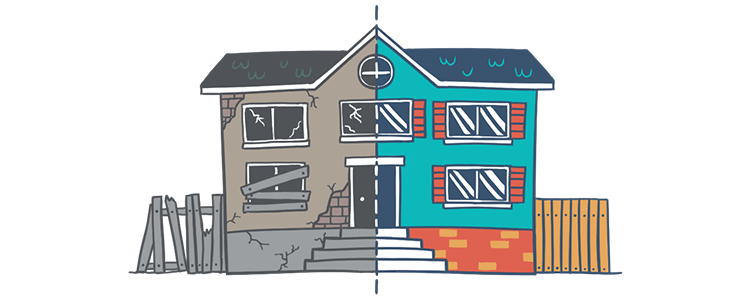FHA 203(k) Rehab Loans

You might be one of the many Americans who decide to buy a “fixer-upper” home. Maybe it needs a whole new kitchen or the flooring needs to be redone. Whatever it is, you might be worried about financing the repairs as well as purchase for your new home. The FHA’s Section 203(k), or Rehabilitation Loan, helps both borrowers and lenders by insuring a single mortgage that covers both the purchase/refinance and rehabilitation of a property.
How it Works
Buying a home in need of considerable "rehabilitation" can be stressful when you’re not sure how to pay for it. Initially, it used to mean a complicated and expensive process, with high interest rates, short repayment terms and a balloon payment.
The FHA Rehabilitation Loan program allows lenders to cover the purchase or refinance, as well as the rehabilitation of the home, as part of a single mortgage. This loan can be used to finance a property that is at least one year old. A part of the money goes toward paying the seller—on in the case of a refinance, it pays off the existing mortgage—with the rest placed in an escrow account, disbursed as rehabilitation goes on.
To qualify for an FHA Rehabilitation Loan, the FHA requires that the total cost of repairs amount to at least $5,000. However, FHA Loan Limits still apply, so the total value of the property must fall within the lending limits for that area. With Rehabilitation Loans, the property value is determined by whichever is less:
- The home’s value before rehabilitation plus the calculated cost of repairs, or
- 110% of the appraised value of the property after repairs.
Keep in mind that the FHA Rehabilitation Loan comes with all of the flexible borrower guidelines that the FHA offers on its other mortgage and refinance programs. However, there are some additional fees that lenders can charge, such as a supplemental origination fee, fees to cover the preparation of architectural documents, and a higher appraisal fee.
Eligible Rehabilitation
FHA’s Section 203(k) insurance can cover anything from minor repairs (as long as they exceed $5000 in cost) to virtual reconstruction (a property that has been demolished as part of rehabilitation is eligible, as long as the existing foundation system is in place). According to HUD, the types of improvements that borrowers can make on their home with an FHA Rehabilitation Loan include:
- Structural alterations and reconstruction.
- Modernization and improvements to the home's function.
- Elimination of health and safety hazards.
- Changes that improve appearance and eliminate obsolescence.
- Reconditioning or replacing plumbing; installing a well and/or septic system.
- Adding or replacing roofing, gutters, and downspouts.
- Adding or replacing floors and/or floor treatments.
- Major landscape work and site improvements.
- Enhancing accessibility for a disabled person.
- Making energy conservation improvements.

FHA Loan Articles
August 10, 2023FHA loans have specific rules and requirements for borrowers who have filed for bankruptcy. The guidelines can change over time, so it's essential to consult with a qualified lender or FHA-approved counselor for the most up-to-date information.
August 3, 2023FHA loans are primarily designed to help individuals and families purchase homes for use as their primary residences. Rules for these loans generally discourage their use for investment properties or rentals. However, there are exceptions that come with strict rules.
July 29, 2023One crucial aspect of FHA loans that borrowers need to understand thoroughly is debt ratios. In this article, we look at how they can impact your ability to secure financing for your dream home. Debt ratios help lenders understand a borrower's creditworthiness and any risks associated with the loan.
July 21, 2023Investing in a multi-unit property can be an excellent way to build wealth through rental income and property appreciation. FHA multi-unit property loans make this opportunity more accessible to a broader range of individuals. You must occupy a unit as your primary residence within 60 days of closing the loan.
July 2, 2023Buying a home is a significant milestone in life, and for many, it's a dream come true. However, the path to homeownership can be fraught with challenges, and one of the most concerning issues can be high FHA loan interest rates.
May 3, 2023Sometimes when buying a home there may be a question of surplus or excess land. You likely won’t face this issue when buying a condo unit, but for other types of purchases, this may be an important factor in the appraisal process.








